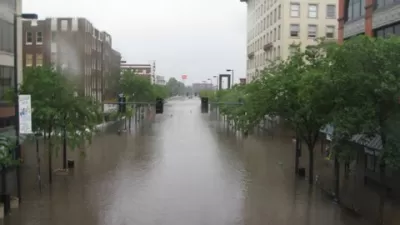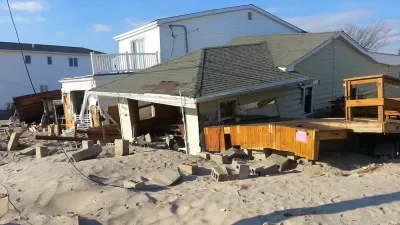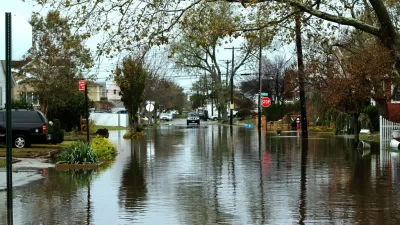Reporting from Cedar Rapids, Iowa, where a 2008 flood devastated 14% of this city of 126,000, John Eligon writes of the extensive rebuilding that has occurred in the flood plain - largely without protection from future floods.

The city's website documents the magnitude of the flooding of the Cedar Rapids River, which "crested to its highest level in Cedar Rapids history on June 13, 2008. The flood waters penetrated 10 square miles or 14 percent of the city. This monumental flood impacted 7,198 parcels, including 5,390 houses, dislocated more than 18,000 residents and damaged 310 City facilities. More flood facts."
Funds of up to $307 million for the rebuilding have flowed from federal, state, and local sources "to redevelop flood-affected public facilities". However, residents rejected - twice - "extending a one-cent sales tax to pay for flood protection". Eligon did not discuss the role that flood insurance played in the rebuilding effort.
There are those who question the extent of the rebuilding considering it's vulnerable location. The essential question facing Cedar Rapids and other cities who "are grappling with competing interests as they work to recover from such disasters: do they restore and rebuild what nature wiped out or do they cede to natural forces and leave waterfronts alone?"
In Cedar Rapids, the economic forces appear too strong to allow nature a stronger role in the flood's aftermath.
When floods wipe out an urban area, city officials tend to favor quick redevelopment to prevent irreparable economic harm, especially in this part of the country.
After the flood, the city bought and demolished about 1,400 homes, but is building 1,311 new housing units within the flood-affected area.
“Somehow we’ve grown into this belief that we have an entitlement for a community to stay exactly where it is,” said Larry Larson, the senior policy adviser for the Association of State Floodplain Managers.
While "there is a growing chorus of conservationists and public officials who say that some land, no matter how prime it is for real estate, might be best returned to nature", they appear to have lost out to the rebuilders. Their warning that "it makes little sense to rebuild in flood-prone areas that will require taxpayer bailouts when the water rises again" is often drowned out by those who want to restore their community, including city officials.
“The alternative to just stay still, to not rebuild, to allow our city to basically fumble in its core just doesn’t make sense for our city,” said Jeff Pomeranz, the Cedar Rapids city manager.
Yet, there are alternatives. "Nearby Cedar Falls, for instance, passed an ordinance after the 2008 flooding that restricted development within the 500-year flood plain."
FULL STORY: Iowa City Rebuilds From Flooding but Remains Vulnerable

Alabama: Trump Terminates Settlements for Black Communities Harmed By Raw Sewage
Trump deemed the landmark civil rights agreement “illegal DEI and environmental justice policy.”

Study: Maui’s Plan to Convert Vacation Rentals to Long-Term Housing Could Cause Nearly $1 Billion Economic Loss
The plan would reduce visitor accommodation by 25% resulting in 1,900 jobs lost.

Planetizen Federal Action Tracker
A weekly monitor of how Trump’s orders and actions are impacting planners and planning in America.

Wind Energy on the Rise Despite Federal Policy Reversal
The Trump administration is revoking federal support for renewable energy, but demand for new projects continues unabated.

Passengers Flock to Caltrain After Electrification
The new electric trains are running faster and more reliably, leading to strong ridership growth on the Bay Area rail system.

Texas Churches Rally Behind ‘Yes in God’s Back Yard’ Legislation
Religious leaders want the state to reduce zoning regulations to streamline leasing church-owned land to housing developers.
Urban Design for Planners 1: Software Tools
This six-course series explores essential urban design concepts using open source software and equips planners with the tools they need to participate fully in the urban design process.
Planning for Universal Design
Learn the tools for implementing Universal Design in planning regulations.
Caltrans
Smith Gee Studio
Institute for Housing and Urban Development Studies (IHS)
City of Grandview
Harvard GSD Executive Education
Toledo-Lucas County Plan Commissions
Salt Lake City
NYU Wagner Graduate School of Public Service





























